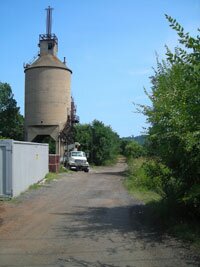ONARCHITECTURE- Capshaw's right? Planners want say in coal tower project

The coal tower property is finally going to be developed, thanks to Coran Capshaw, but what will it look like?PHOTO BY DAVE MCNAIR
On August 14, the site plan for Coran Capshaw's 10.656-acre coal tower development went before the Planning Commission.
Only a stone's throw away from the east end of the Downtown Mall and extending practically all the way to Meade Avenue, the development– almost 100,000 square feet of commercial/retail space and several buildings, some as high as nine stories– is one of the biggest city developments the Commission has seen. However, thanks to the city's 2003 zoning overhaul, it's also one of the biggest developments the Commission– not to mention the Board of Architectural Review and City Council– will have little or no control over.
In fact, city staff seems to have presented the project to the Commission almost as a courtesy, as the staff report accompanying the site plan– complete with bold-face type for emphasis– seems to indicate: it refers to site approval as a "ministerial function" over which "the Planning Commission has little or no discretion." Ouch!
The referral offers another statement with a bold emphasis: "When an applicant has submitted a site plan that complies with the requirement of the City's Site Plan Ordinance, then approval of the plan must be granted."
Indeed, a recent Daily Progress report on the coal tower project was the first time some Committee members had heard of its preliminary approval.
"I was surprised that it didn't come before us," said Commission member Cheri Lewis. "It was a complete surprise. We've seen five-unit condos, Walker Square, Belmont Lofts. A major subdivision with more than 10 lots and the creation of public streets– that always comes before the Commission. It's interesting this got preliminary approval from the city before it went to the Planning Commission."
However, as the staff report makes clear, the coal tower project is a "by-right" development that allows Capshaw– who launched the Dave Matthews Band to worldwide acclaim– to move forward simply by following city code. Addressing public concerns about the design, scale, and even the economic feasibility of the project is at the discretion of the developer: current zoning gives the public no official authority to determine what gets built.
"We changed the zoning when nothing was happening," says former mayor Maurice Cox, one of the authors of the new zoning. "Now it's happening everywhere" he says of new development projects. "Unfortunately, we didn't create a design oversight mechanism."
While Cox and other city planners are happy to see this kind of dense, pedestrian-friendly development became a reality, they're worried about what it might produce. Several architects and planners suggest that Capshaw expertise in the musical business has yet to bear fruit in the architectural field, even though he's already built two condominium complexes– Riverbend and Walker Square– as well as the Charlottesville Pavilion.
"So far I haven't seen Capshaw produce a quality architectural product," says UVA architecture professor William Moorish, an internationally known urban planner.
The Hook's calls to Capshaw and his Atlanta-based developer, Dillon Baynes, were not immediately returned. However, according to a 2004 story in The Story, an Atlanta-based weekly, Baynes has done several urban projects in Altanta, with an emphasis on walkability and blending the new development into the fabric of the existing neighborhood. And his own Craftsman-style bungalow was part of a recent Atlanta open house tour. Can Baynes translate his love of urban settings into something Charlottesville design mavens will like?
"We have a downtown that's rich, varied, and textured, and it's because of design oversight," says Cox, "because of talented people who contributed. We need to find a way to encourage developers to raise the bar architecturally... because, unfortunately, we don't have any design control mechanism in place."
Although the Hook went to press before the Planning Commission's August meeting, some members said they are hopeful that they will have some influence over the project, as issues like water management, traffic, and pedestrian access will inevitably involve further discussion between team Capshaw and the city.
Moorish, an internationally known urban planner, says he thinks urban developments "enrich" Charlottesville, as the city shows no signs of slowing growth. But he yearns for a serious discussion about design and urban integration.
"Will transit serve this development to shopping on Pantops and Barracks beyond 5pm?" Moorish asks. "Are the City and County getting their transit ready to serve this new development? Will the development support the region's interest in sustainability, such as low energy use and reduced water consumption?"
Even though the development is "by right," Moorish says it will still need city support for the infrastructure to make it part of the community, and that could trump the new zoning.
He also years for affordable options. "Workforce housing," Moorish says, "should not be isolated to one bedroom; this will not support a family."
"I'd think 'green enrichments' would be a big market draw," says Moorish, "or is this the same old stuff that one can see on 66 in Northern Virginia? As citizens and potential buyers," Moorish says, "I guess the question is whether we want more from the developer than they think we want in our city."
#
2 comments
Why does a great city like Charlottesville get such dumb@sses for mayors?
Of course the joke of a mayor we have now makes Cox look good to some extent, but you've got to wonder how someone who is not only an architect, but a freaking ARCHITECTURE PROFESSOR could do such a dumb thing as open the flood gates for bad architecture.
There is a delicate balance between stimulating economic expansion and mandating development requirements. Local regulations can be effectively trimmed if community involvement is genuinely acknowledged. To condemn the Capshaw coal tower development before it is started, shackles future development while discounting the power of the Charlottesville community.